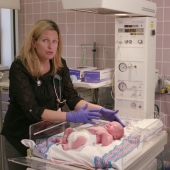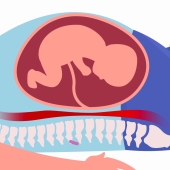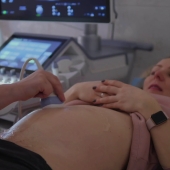Many women experience bloating when pregnant and they may wonder why. The reason is that the hormone progesterone, which is associated with pregnancy, causes the smooth muscle tissue of the uterus to relax, which will allow it to stretch to accommodate a growing baby.
But the same hormone also relaxes all of the other smooth muscle tissues in the body, including the tissue of the digestive tract. The relaxation causes digestion to slow down.
As the pregnancy progresses, the growing baby can put pressure on the digestive tract causing digestion to slow even more. When digestion slows down, gas and bloating can result.
Remedies for Bloating During Pregnancy
Because your digestive system is especially fragile early in pregnancy, you will often have feel bloated. Luckily there are some things you can do to help prevent bloating:
Take Laxatives: It is unwise to resort to medication too often, and this is equally true of prescription and over-the-counter laxatives. There are times, however, when you may be able to obtain a little relief from anti-bloating medication, or even from certain home remedies. Stool softeners whose active ingredient is docusate sodium are generally considered safe, and mineral oil is also safe if you do not use it too often (regular use is believed to interfere with the body’s ability to absorb fat-soluble vitamins).
Eat foods high in fiber: Whole wheat toast, carrots, apples, oatmeal, whole-grain bagels, and pears are all good sources of fiber. The fiber absorbs the water in your digestive system and helps move the food through your intestines. Rice, leafy greens, and yams are also helpful foods.
Exercise daily: Taking walks or doing simple exercises like pelvic rocks can help you release the gas that is building up inside you. Walking stimulates your digestive system, especially after eating.
Drink more water: Believe it or not, water is actually good for you when you feel bloated; it helps flush out your system and prevents bloating and swelling.
Say NO to refined sugars: Many women develop a sweet tooth while pregnant, and for some reason refined sugars affect many pregnant women. Also avoid drinking artificially sweetened fruit juices. Soda is probably the worst thing to drink; it contains a lot of high fructose corn syrup that contributes to bloating, and the carbonation doesn’t help either. Fresh fruits such as bananas, peaches, and apricots are better ways to satisfy a craving than drinking soda or eating candy.
Eat smaller portions: Eating smaller portions can be difficult when you’re pregnant, but it helps to reduce bloated feelings throughout the day. The goal is to avoid overloading your digestive system, and you can do this by reducing portions while eating more frequently throughout the day.
Eat more slowly: Mom always said, “Chew your food before swallowing!” Well, she was right, and it’s especially important when you’re pregnant. You need to eat slowly in order to give each bite a chance to settle and make its way into the digestive tract. Again, you don’t want to overload your digestive system. Also, when you eat quickly you are more likely to swallow air.
Avoid gassy foods: Certain foods, such as onions, beans, and cabbage, are known to trigger gas, and even though we crave these foods, it’s best to stay away from them as much as possible in order to avoid becoming bloated. You probably have your own list of foods that give you gas, and you should avoid those, too.
Avoid stressful situations: Tension can cause us to swallow too much air. Try relaxing more, and avoid talking about subjects that upset you. Meditation can help you cope with stress.
Avoid fried foods: Fried and fatty foods don’t cause gas by themselves, but they are known to slow down your digestive process — which gives you gas and can increase your bloating.
- 3904 views













